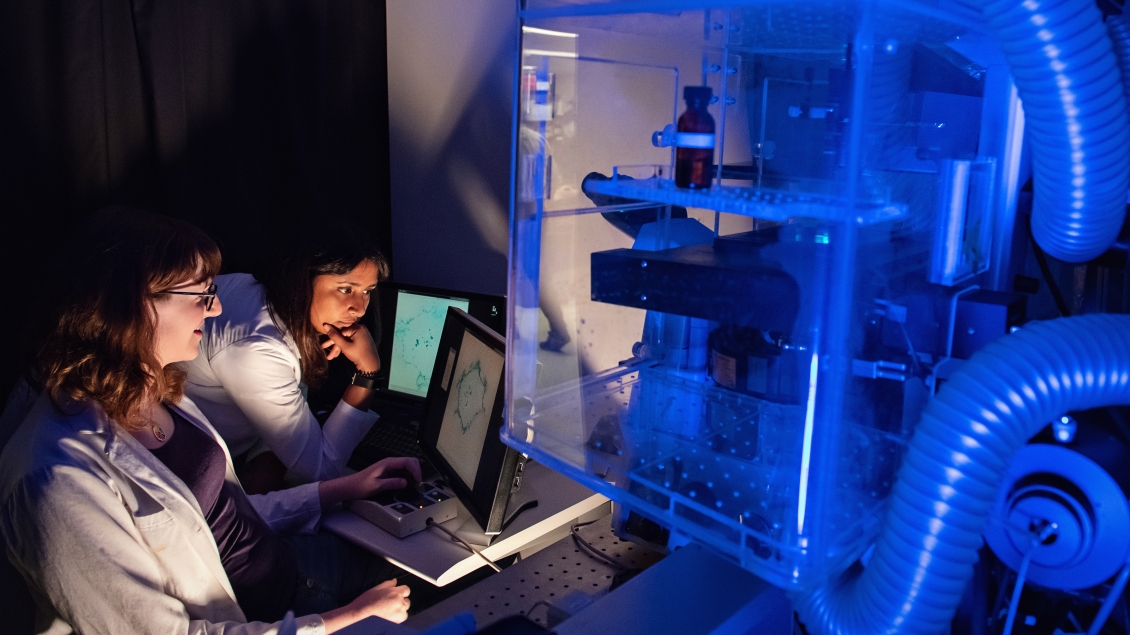-
Bioinformatics -
Biological Chemistry -
Cancer Biology -
Cell & Developmental Biology -
Cellular & Molecular Biology -
Genetics and Genomics -
Health Infrastructures & Learning Systems -
Immunology -
Microbiology & Immunology -
Molecular, Cellular & Developmental Biology -
Molecular & Cellular Pathology -
Molecular & Integrative Physiology -
Neuroscience -
Pharmacology

Genetics and Genomics
Furthering our understanding of biology and human disease
Program Overview
The Department of Human Genetics at the University of Michigan was founded by Dr. James V. Neel in 1956 and was the first human genetics department in the United States. The initial focus of the department was human heredity, and this view has grown in breadth and depth through the genomic and post-genomic eras.
Our faculty include AAAS, National Academy and Institute of Medicine Fellows, Howard Hughes Investigators, and winners of University and Medical School teaching awards. Interactions among students and faculty ensure a comprehensive foundation in the many aspects of genetics, from genome function, to population diversity and the molecular mechanisms of disease. Collaborations within the department, across the University, nation-wide and internationally emphasize the crucial role of genetics in addressing global problems in human biology and disease.
A central mission of the Genetics and Genomics Graduate Program is to train students to confront these problems scientifically through a rigorous but flexible foundation in coursework and research.
Graduate students have the opportunity to carry out interdisciplinary genetics research in diverse areas.
Examples of current research topics include:
- Cancer genetics
- Developmental genetics
- DNA recombination and repair
- Epigenetics
- Evolutionary and population genetics
- Genome structure, function, and regulation
- Genetic mapping of complex traits and diseases
- Medical genetics
- Molecular basis of Mendelian Disorders
- Neurogenetics
- Statistical genetics and genetic epidemiology
- Stem Cells
The multidisciplinary nature of this research is demonstrated by strong faculty involvement in the Genetics Training Program and Genome Science Training Grants, which are both supported by the NIH for 40 and 25 years, respectively. The Genetics Training Program is directed from the Department of Human Genetics, with faculty and student participation from five other PhD programs. The Genome Science Training Grant is co led by HG, with faculty and student participation from eight other PhD programs across the University of Michigan campus.
Genetics and Genomics students and faculty also participate in training programs in Bioinformatics; Cancer Biology; Genome Sciences; Organogenesis; Reproductive Biology; and Hearing, Balance, and Chemical Senses.
Coursework
The core training in Genetics and Genomics consists of courses in molecular genetics, the genetic basis of human disease, and quantitative and statistical genetics. Additional courses are selected from within the Department of Human Genetics and throughout the University to strengthen one or more core areas. Coursework is designed to meet the individual training goals of students in the Program.
In addition to the core courses, students participate in the weekly student seminars, in which they learn to analyze and present research literature before the greater genetics community, including faculty and students. In the second year, students take Current Topics, a small class that focuses on current methods in genetic research through discussions of selected primary scientific literature, with student-led presentations.
The interactive and interdisciplinary nature of Genetics and Genomics is also highlighted by Departmental and training program seminars on cutting-edge topics presented by high-profile outside speakers, some of whom are selected by the students.
Preliminary Examination
Students take a preliminary examination during the Summer after their first year. The exam is a written and oral defense of the student’s proposed thesis research. Students advance to candidacy once they have passed the preliminary examination, completed certain course requirements, and received the approval of their thesis research mentor.
Teaching Requirement
While teaching is not a Program requirement, most Genetics and Genomics students spend at least one term as a teaching assistant, generally in their second or third year. Additional teaching opportunities are available through several outreach programs.
Expected Length of Program
After completion of required coursework, the doctoral dissertation is generally completed within 5 years of graduate study; however, this varies among students.
The Department of Human Genetics includes more than 21 Genetics and Genomics PhD students, as well as 27 primary faculty and 16 joint faculty whose primary appointments represent six additional departments. Up to eight students join our program each year and the Department is in an active growth phase with faculty added over the last few years and more recruitment planned.
Our students have received national fellowships and awards for their research, have served on national committees including in the American Society of Human Genetics, and have been recognized with the University of Michigan Distinguished Dissertation Award, the highest honor the University confers to recognize graduate student accomplishments.
Students get to know faculty and their research through numerous events throughout the year, including the Department retreat, Genetics and Genomics Retreat, the James V. Neel Lectureship, and the Thomas D. Gelehrter Lectureship. The Department of Human Genetics sponsors a seminar series of external speakers, short courses with several speakers on a related theme, and a weekly seminar given by trainees in the Department. There are also a variety of informal special interest groups that offer opportunities for students to present and get advice on their research findings.
Over 180 Genetics and Genomics PhD graduates have gone on to successful careers in academic research and teaching, biotechnology, and scientific consulting, among other professions.
Learn more about the Department of Genetics and Genomics.